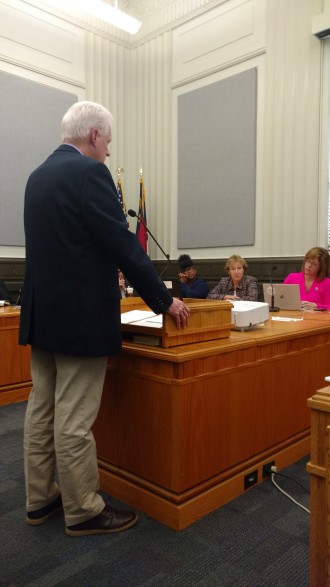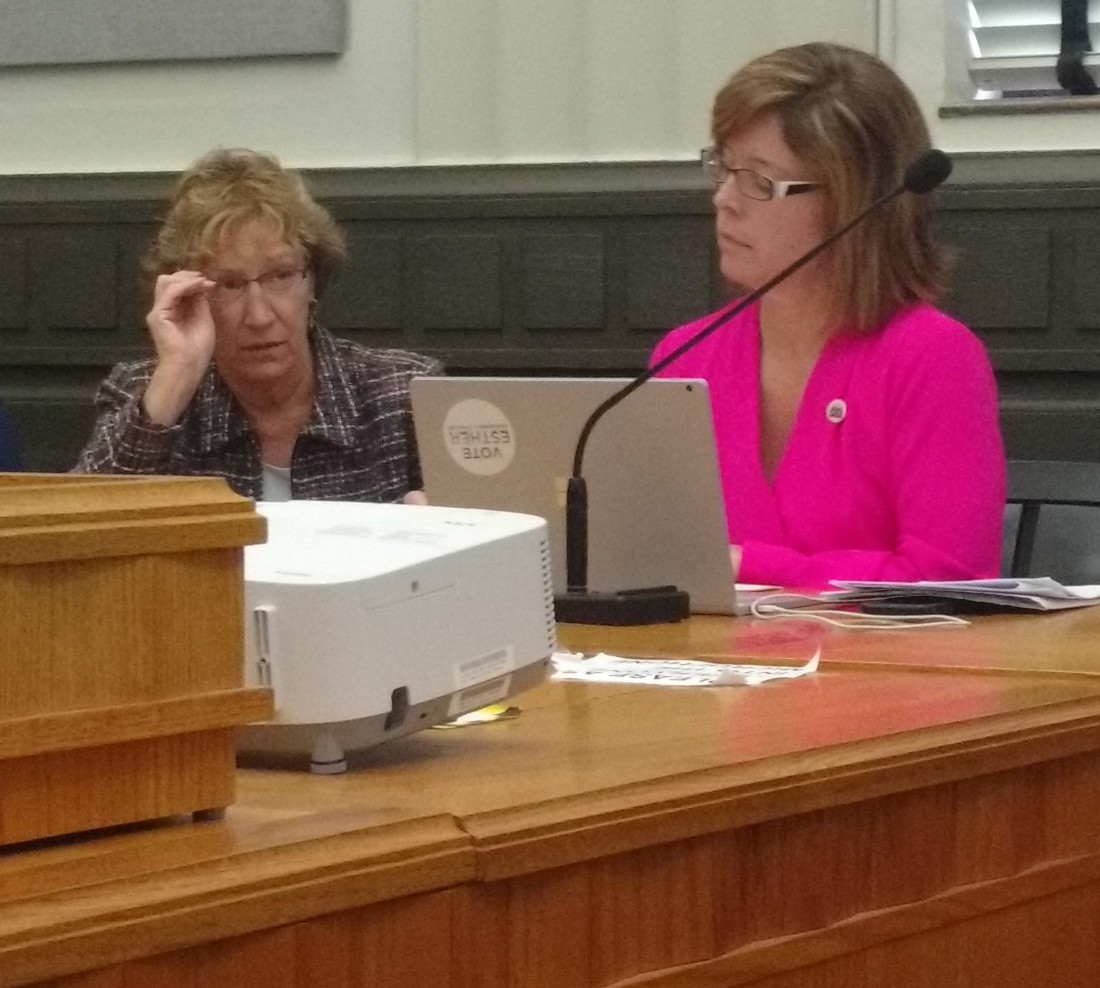Those parking downtown may soon find themselves racing against the clock after changes approved by Asheville City Council at its April 24 budget work session. In a move estimated to yield an additional $800,000 of annual revenue, Council unanimously decided to provide free parking at city parking decks only for vehicles that exit within one hour.
The change came as Council considered its options for closing the remainder of the city’s budget gap for fiscal year 2018-19. Initially projected at $3.4 million, the shortfall was reduced by city staff and Council members to $2.2 million at an April 10 work session. By law, the city cannot pass a budget that includes deficit spending.
At the start of the work session, city Chief Financial Officer Barbara Whitehorn outlined the progress staff had made since April 10. Funding for the incoming Asheville Police Department police academy class was reduced by half, from $800,000 to $400,000, a decision Whitehorn said was reached in agreement with Chief Tammy Hooper. The cut represented a step back from an earlier proposal by Council member Brian Haynes, which would have eliminated $1.2 million from the APD budget.
An additional $100,000 off of the gap resulted from renegotiations of Buncombe County property tax billing services, for which Mayor Esther Manheimer commended Vice Mayor Gwen Wisler. In combination with other changes, including a reduction of a planned city employee raise from 3 percent to 2.5 percent and a $10 increase in monthly parking fees, these savings had reduced the budget gap to $971,000 at the start of the meeting.
Parking, Whitehorn explained, provided a key opportunity to close that gap. Her staff’s original proposal would have eliminated the first hour free for all transactions, generating $1 million annually in income. “There was a significant concern about [how] that hour free is what people use to run errands downtown,” she said.

Instead, Whitehorn presented a proposal by budget analyst Taylor Floyd that maintained free parking for all stays of under an hour. She pointed to the success of the model for other institutions, such as the Dallas/Fort Worth International Airport, and had transportation department director Ken Putnam present data showing that the change would still free up roughly $800,000 per year.
Whitehorn said her staff had also explored the possibility of differential parking rates for residents and visitors, but she noted that the city’s lawyers had ruled out the option. The crowd in the full conference room chuckled knowingly as Manheimer asked Whitehorn to reiterate the legal problems with making policies that apply differently for locals.
Teetering on transit
Although Council eventually consented to the parking policy change, Council member Julie Mayfield expressed her concern about its potential impact on transit planning. At the April 10 work session, Council had considered allocating the additional parking revenue from a full elimination of the first hour free policy to expanding transit service.
“This community wants transit. I think that’s clear — we’ve heard from lots of people [saying] ‘We want expanded hours,’” Mayfield said. The new budget still calls for adding a transit planner, but interim City Manager Cathy Ball noted that another key staff member may be leaving the transportation department, putting its ability to handle expanded service into question.
Council member Keith Young jumped on that point, voicing his concerns about the department’s capacity. “When the conversations earlier were mentioning staffing issues… my mind automatically went to more than one person,” he said. “To hear that it’s all on the shoulders of one or two people is really disheartening.”
While city staff said they would find a way to fulfill transit directives regardless of staffing, Wisler urged them to stay realistic when presenting options to Council. “Tell us what is not going to get done or what is going to be substantially delayed,” she said. “We have got to stop asking for miracles — we’re out of miracles. I want staff to be honest with us.”
Funding the finish
Council decided to fill the remaining $171,000 of the gap from the city’s general fund balance. That sum is in addition to $300,000 assigned from the fund during previous discussions; the total allocation still keeps the unassigned fund balance above Council’s policy minimum of 15 percent of budgeted expenditures.
Whitehorn brought in the previous finance director for the city of Charlotte, Doug Carter, to back up her staff’s recommendation for using the fund. He complimented the city’s recent AAA bond rating from Moody’s Investor Services and said that its proposed budget should pose no risk to that assessment, citing other municipalities throughout the state.
“I think adding a small amount to balance the budget in an annual period such as this is very North Carolina-like. It’s very AAA credit-like,” Carter explained. “I think what you’re doing is showing good financial management.”
Council member Vijay Kapoor, who had previously floated the idea of a property tax increase to avoid dipping into the fund, appeared satisfied with the move. He seconded the motion after Wisler moved to adopt the city staff’s recommendations.
The budget now goes to staff for finalization before being formally presented to Council at its next regular meeting in Council Chambers on Tuesday, May 15. A public hearing will take place on Tuesday, May 22, and the final budget adoption vote occurs on Tuesday, June 19.



Before you comment
The comments section is here to provide a platform for civil dialogue on the issues we face together as a local community. Xpress is committed to offering this platform for all voices, but when the tone of the discussion gets nasty or strays off topic, we believe many people choose not to participate. Xpress editors are determined to moderate comments to ensure a constructive interchange is maintained. All comments judged not to be in keeping with the spirit of civil discourse will be removed and repeat violators will be banned. See here for our terms of service. Thank you for being part of this effort to promote respectful discussion.